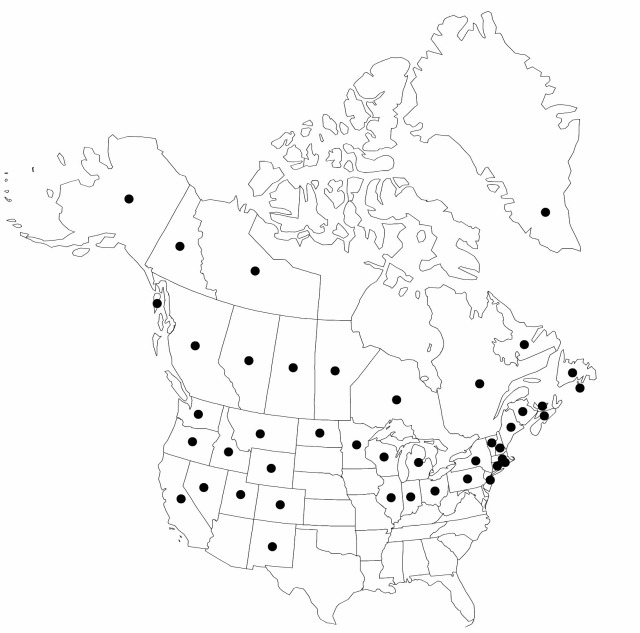Difference between revisions of "Carex viridula"
Fl. Bor.-Amer. 2: 170. 1803.
RevisionBot (talk | contribs) m (Bot: Adding category Revision Pending) |
RevisionBot (talk | contribs) m (Bot: Adding category Revised Since Print) |
||
| (One intermediate revision by one other user not shown) | |||
| Line 83: | Line 83: | ||
|publication year=1803 | |publication year=1803 | ||
|special status=Illustrated | |special status=Illustrated | ||
| − | |source xml=https:// | + | |source xml=https://bitbucket.org/aafc-mbb/fna-data-curation/src/2e0870ddd59836b60bcf96646a41e87ea5a5943a/coarse_grained_fna_xml/V23/V23_983.xml |
|genus=Carex | |genus=Carex | ||
|section=Carex sect. Ceratocystis | |section=Carex sect. Ceratocystis | ||
| Line 93: | Line 93: | ||
[[Category:Treatment]] | [[Category:Treatment]] | ||
[[Category:Carex sect. Ceratocystis]] | [[Category:Carex sect. Ceratocystis]] | ||
| − | [[Category: | + | [[Category:Revised Since Print]] |
Latest revision as of 18:37, 6 November 2020
Plants cespitose. Culms straight or arcuate, 2–85 cm. Leaves of flowering stems shorter than to exceeding culms, to 20 cm × 0.8–5.4 mm; ligules on distal cauline leaves usually obsolete (except in 414.b Carex viridula subsp. brachyrrhyncha). Inflorescences: peduncles of terminal staminate spikes 0–28 mm; bracts to 18 cm × 0.6–3.4 mm; inner band of sheaths concave or truncate. Spikes: proximal pistillate spikes 1–8, contiguous or proximal distant, sessile or short-pedunculate, globose to short-cylindric, 4–17.5 × 3–11 mm; terminal staminate spike sessile or pedunculate, 5–25 × 1–3.6 mm. Scales: pistillate scales pale brown to reddish brown, 1.4–3.2 × 0.8–1.7 mm, margins pale, narrow, hyaline; staminate scales reddish brown, lanceolate to ovate, 2.3–5.2 × 0.7–2 mm, margins narrowly pale hyaline, apex obtuse to acuminate. Anthers 0.9–3.1 mm. Perigynia spreading, yellow to dark olive, 1.8–4.2 × 0.8–2 mm, apex gradually or abruptly narrowed; beak straight or reflexed less than 20°, 0.3–2.1 mm, scabrous or smooth. Achenes 1–1.8 × 0.7–1.4 mm.
Distribution

Alta., B.C., Man., N.B., N.S., N.W.T., Ont., P.E.I., Que., Sask., Yukon, Alaska, Calif., Colo., Conn., Idaho, Ill., Ind., Maine, Mass., Mich., Minn., Mont., N.Dak., N.H., N.J., N.Mex., N.Y., Nev., Ohio, Oreg., Pa., R.I., Utah, Vt., Wash., Wis., Wyo., Europe, Asia, Africa (Morocco).
Discussion
Subspecies 3 (3 in the flora).
Selected References
None.
Lower Taxa
Key
| 1 | Proximal perigynia in each spike reflexed; beak of perigynium forming angle greater than 20° with body; staminate spike on peduncle usually more than 4.5 mm; ligules of distal cauline leaves truncate or rounded, usually well-developed. | Carex viridula subsp. brachyrrhyncha |
| 1 | Perigynia spreading, straight (curvature at junction of body and beak less than 25°); staminate spike subsessile to long-pedunculate; ligules of distal cauline leaves usually obsolete. | > 2 |
| 2 | Perigynia less than 3 mm. | > 3 |
| 2 | Perigynia 3 mm or greater. | > 4 |
| 3 | Leaves thickened, somewhat succulent, recurved; culms less than 5 cm; staminate spike less than 6.5 mm; coastal areas of Newfoundland and Briar Island, Nova Scotia. | Carex viridula subsp. brachyrrhyncha |
| 3 | Leaves neither thickened nor recurved; culms greater than 5 cm; staminate spike 7+ mm; widespread. | Carex viridula subsp. viridula |
| 4 | Proximal pistillate spike remote, often nearly basal; perigynia and foliage often olive or dark green; culms often arcuate or sinuous; staminate spikes on peduncles 3–28 mm. | Carex viridula subsp. oedocarpa |
| 4 | Pistillate spikes contiguous or aggregated; foliage grayish or light green; perigynia grayish green to yellowish green; culms erect; staminate spikes on peduncles to 20 mm. | Carex viridula subsp. viridula |